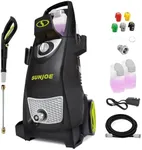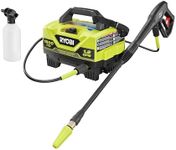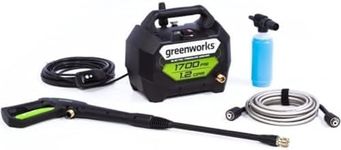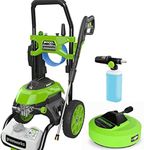Buying Guide for the Best Electric Pressure Washers
Choosing the right electric pressure washer can make cleaning tasks around your home much easier and more efficient. Whether you want to wash your car, clean your patio, or remove dirt from outdoor furniture, understanding the key features of electric pressure washers will help you select a model that fits your needs. It's important to think about what you'll be cleaning most often and how much power and convenience you require. By focusing on the main specifications, you can find a pressure washer that is both effective and easy to use.Pressure (PSI)PSI stands for pounds per square inch and measures the water pressure the washer can deliver. This is important because higher PSI means more cleaning power, which is useful for tough stains or large surfaces. Light-duty washers usually have a PSI of up to 1,800, which is good for cars, bikes, and patio furniture. Medium-duty models range from 1,800 to 2,800 PSI and are suitable for driveways, decks, and fences. Heavy-duty washers go above 2,800 PSI and are best for stubborn grime or large areas. To pick the right PSI, think about the toughest job you plan to tackle and choose a washer that meets or slightly exceeds that requirement.
Water Flow Rate (GPM)GPM stands for gallons per minute and tells you how much water the washer uses. This matters because a higher GPM means you can rinse away dirt faster, making cleaning more efficient. Light-duty washers often have a GPM of 1.2 or less, which is fine for small jobs. Medium-duty models usually offer 1.2 to 2.0 GPM, balancing power and water use for most home tasks. Heavy-duty washers can go above 2.0 GPM for faster cleaning of large or very dirty areas. Consider how quickly you want to finish your cleaning and how much water you can use, then choose a GPM that matches your needs.
Motor TypeElectric pressure washers use either universal (brushed) or induction (brushless) motors. Universal motors are lighter and less expensive but tend to be noisier and wear out faster. Induction motors are quieter, more durable, and better for frequent or longer cleaning sessions. If you plan to use your washer occasionally for light tasks, a universal motor may be enough. For regular or heavy use, an induction motor is a better choice for reliability and longevity.
Portability and WeightPortability refers to how easy it is to move the pressure washer around. Lighter models are easier to carry and store, making them ideal for small spaces or quick jobs. Heavier models may have wheels and handles to help with movement, which is useful if you need to cover a larger area or move the washer over uneven ground. Think about where you'll use the washer and how much lifting or moving you'll need to do, then choose a model that matches your comfort level.
Hose LengthThe hose length determines how far you can reach from the main unit without moving it. Short hoses (under 20 feet) are fine for small patios or cars parked close by. Medium hoses (20-30 feet) offer more flexibility for larger driveways or decks. Long hoses (over 30 feet) are best if you want to clean large areas without constantly moving the washer. Consider the size of the areas you plan to clean and pick a hose length that lets you work comfortably.
Nozzle OptionsNozzles control the spray pattern and pressure, allowing you to adjust the washer for different tasks. Most washers come with several nozzles or an adjustable nozzle. Narrow nozzles (like 0° or 15°) provide a strong, focused spray for tough stains, while wider nozzles (like 40°) are gentler and better for delicate surfaces. Some models include a soap nozzle for applying detergent. Think about the variety of surfaces you'll clean and make sure the washer offers the nozzle options you need for safe and effective cleaning.
Detergent SystemA detergent system lets you apply soap or cleaning solution through the washer, which helps break down dirt and grime. Some washers have built-in detergent tanks, while others use a siphon tube to draw soap from an external container. Built-in tanks are more convenient for quick jobs, while siphon systems can hold more detergent for bigger tasks. If you plan to use soap often, look for a washer with a detergent system that matches your cleaning habits.


















